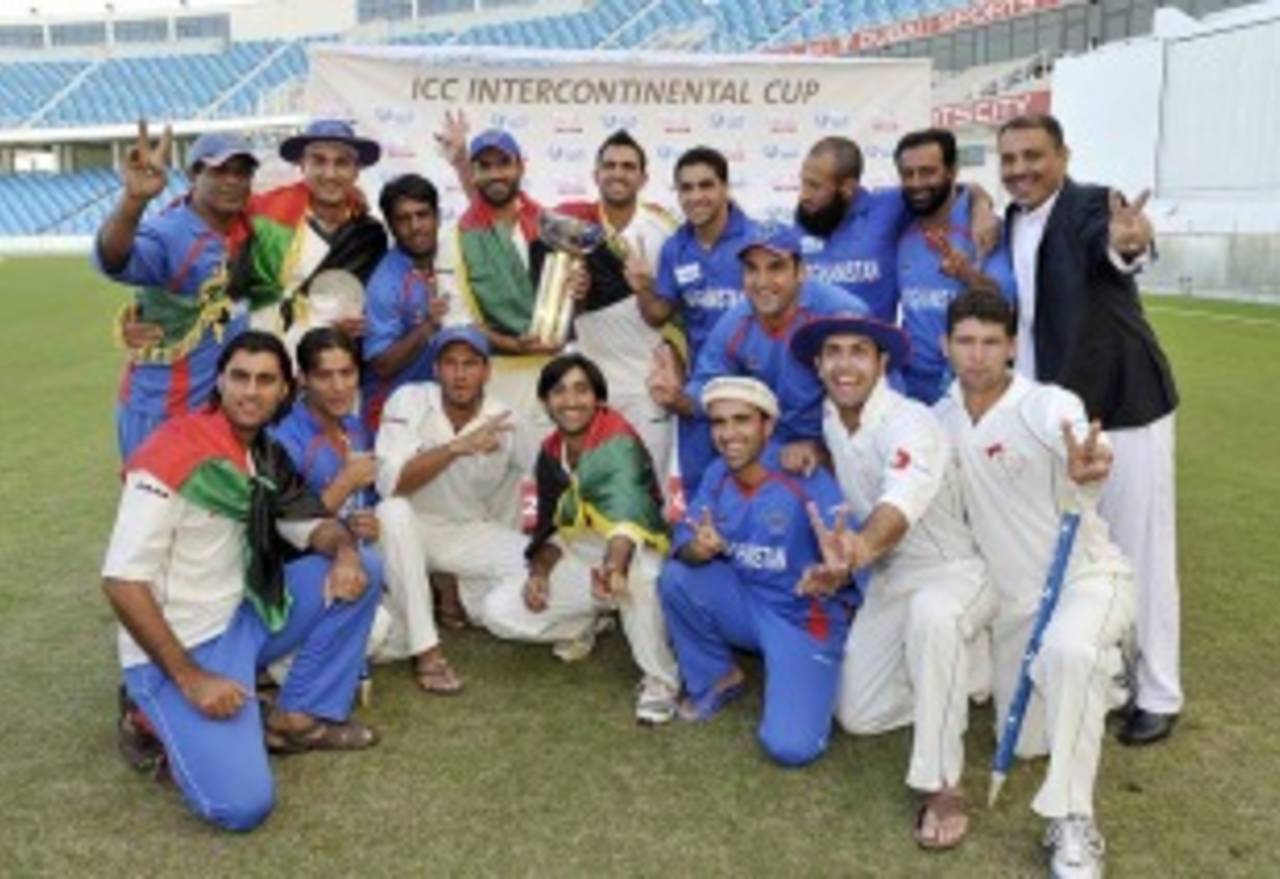ICC Intercontinental Cup
A brief history of the ICC Intercontinental Cup

Afghanistan secured the Intercontinental Cup in 2010 and in so doing ended European domination of the competition • International Cricket Council
Winner Scotland
Runner-up Canada
Teams 12
Format Four regional groups of three teams, winners into semi-finals
The inaugural tournament was widely considered a success. Four three-country groups ensured that each side had a minimum of two qualifying matches. The toughest group by far was that featuring Scotland, Ireland and Holland - probably three of the strongest five teams in the competition - and Scotland, whose exposure to regular top-class cricket in the English National League showed - went through courtesy of their defeat of Ireland, who had already beaten Holland. The Americas group was won by Canada, and Kenya won Africa where Uganda sprung a major surprise by beating Namibia. In Asia, Nepal thrashed Malaysia but were pipped by UAE who gained more bonus points in their victory over the same opponents. Kenya, ripped apart by internal politics, fielded a reserve side in the semis and were thumped by Scotland while Canada saw off UAE.
The final was unexpectedly one-sided as Canada were bowled out for 110 and 95 and lost by an innings to Scotland, who only managed 287 for 8 and were indebted to Gavin Hamilton's 115.
Winner Ireland
Runner-up Kenya
Teams 12
Format Four regional groups of three teams, winners into semi-finals
In the second year the deficiencies of the bonus points system became all too clear, and sides who had matches rained off were placed at a major disadvantage. Holland and Scotland were always facing a mountain after their meeting was abandoned, and sides grew wise to the way to milk a flawed system. USA were thrown out of the competition by the ICC after a row with the USA Cricket Association, and Bermuda came through against a weakened Canadian side. Kenya, restored to full strength, won the Africa group while in Asia, UAE advanced to the last four on bonus points despite being routed by Nepal, whose game against Hong Kong had been blighted by rain. The finals were held in Namibia, and Ireland convincing outplayed UAE in a one-sided draw, while Kenya won through after a tighter draw against Bermuda, thanks largely to Steve Tikolo's 220. Both matches underlined the fact that three days was simply not enough.
Kenya controlled the first two days of the final, Tikolo again to the fore with 177*, but an enterprising declaration by Ireland caught the Kenyans cold, and they collapsed in their second innings to set Ireland 245 to win. The Kenyan bowlers lacked any control and Ireland eased to a deserved six-wicket victory.
Winner Ireland
Runner-up Canada
Teams 8
Format Two groups of four, winners into final. A challenge match to decide the eighth place in the tournament.
The mess with bonus points led to a rejig and a reduction in the number of teams, but the logistic need to bunch matches together meant that Canada were assured of a final place after two wins inside a fortnight while Namibia were eliminated within a fortnight of the competition's start. A rather disjointed competition ended with a final in Leicester which was over within two sessions as an unprepared Canadian side were skittled for 92 and Ireland raced to 202 for 0. An innings win was wrapped up within two days.
Winner Ireland
Runner-up Namibia
Teams 8
Format A single round-robin league of eight teams, with each one playing seven games. The teams ranked first and second at the conclusion of the group stage, Ireland and Namibia, contested the final.
Winner Afghanistan
Runner-up Scotland
Teams8
FormatA single round-robin league of eight teams, with each one playing seven games. The teams ranked first and second at the conclusion of the group stage contested the final
Martin Williamson is executive editor of Cricinfo and managing editor of ESPN Digital Media in Europe, the Middle East and Africa